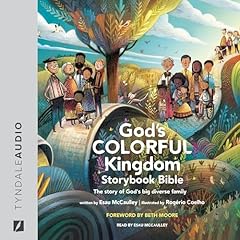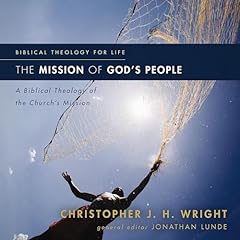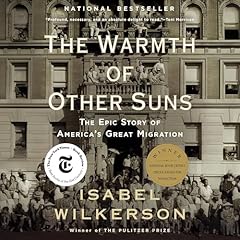
How Far to the Promised Land
One Black Family's Story of Hope and Survival in the American South
No se pudo agregar al carrito
Solo puedes tener X títulos en el carrito para realizar el pago.
Add to Cart failed.
Por favor prueba de nuevo más tarde
Error al Agregar a Lista de Deseos.
Por favor prueba de nuevo más tarde
Error al eliminar de la lista de deseos.
Por favor prueba de nuevo más tarde
Error al añadir a tu biblioteca
Por favor intenta de nuevo
Error al seguir el podcast
Intenta nuevamente
Error al dejar de seguir el podcast
Intenta nuevamente
 Exclusivo para miembros Prime: ¿Nuevo en Audible? Obtén 2 audiolibros gratis con tu prueba.
Exclusivo para miembros Prime: ¿Nuevo en Audible? Obtén 2 audiolibros gratis con tu prueba.
Elige 1 audiolibro al mes de nuestra inigualable colección.
Acceso ilimitado a nuestro catálogo de más de 150,000 audiolibros y podcasts.
Accede a ofertas y descuentos exclusivos.
Premium Plus se renueva automáticamente por $14.95 al mes después de 30 días. Cancela en cualquier momento.
Compra ahora por $18.00
-
Narrado por:
-
Esau McCaulley
-
De:
-
Esau McCaulley
“Powerful . . . McCaulley uses examples of his own family’s stories of survival over time to remind readers that some paths to the promised land have detours along the way.”—The Root
A PUBLISHERS WEEKLY BEST BOOK OF THE YEAR
For much of his life, Esau McCaulley was taught to see himself as an exception: someone who, through hard work, faith, and determination, overcame childhood poverty, anti-Black racism, and an absent father to earn a job as a university professor and a life in the middle class.
But that narrative was called into question one night, when McCaulley answered the phone and learned that his father—whose absence defined his upbringing—died in a car crash. McCaulley was being asked to deliver his father’s eulogy, to make sense of his complicated legacy in a country that only accepts Black men on the condition that they are exceptional, hardworking, perfect.
The resulting effort sent McCaulley back through his family history, seeking to understand the community that shaped him. In these pages, we meet his great-grandmother Sophia, a tenant farmer born with the gift of prophecy who scraped together a life in Jim Crow Alabama; his mother, Laurie, who raised four kids alone in an era when single Black mothers were demonized as “welfare queens”; and a cast of family, friends, and neighbors who won small victories in a world built to swallow Black lives. With profound honesty and compassion, he raises questions that implicate us all: What does each person’s struggle to build a life teach us about what we owe each other? About what it means to be human?
How Far to the Promised Land is a thrilling and tender epic about being Black in America. It’s a book that questions our too-simple narratives about poverty and upward mobility; a book in which the people normally written out of the American Dream are given voice.
Los oyentes también disfrutaron:




















Reseñas de la Crítica
“With uncompromising honesty and deep introspection, McCaulley complicates the narrative of ‘overcoming racism and poverty as a hero.’ . . . Powerful and necessary.”—Publishers Weekly (starred review)
“A thoughtfully written book that offers heartfelt, empathetic lessons without preaching to the choir.”—Kirkus Reviews
“Esau McCaulley’s riveting memoir holds together tensions that many of us pry apart: systemic injustice and personal responsibility, accountability and forgiveness, honesty and sympathy. This book is prophetic without being preachy, and heartwarming without being cloying. . . . A triumph of storytelling.”—Tish Harrison Warren, author of Liturgy of the Ordinary
“A riveting book that invites you into the personal journey of one of the finest writers alive today.”—Beth Moore, president of Living Proof Ministries and bestselling author of All My Knotted-Up Life
“In these pages are words that redeem time and refresh the human spirit. . . . The timeliness of McCaulley’s honest, hope-filled story—told with depth, precision, and purpose—feels like a balm for the weary soul.”—Charlie Dates, senior pastor of Salem Baptist and Progressive Baptist
“As soon as I finished, I wanted to reread. McCaulley is already recognized as a great scholar and essayist, but this is his best writing yet. The storytelling here is both poetic and prophetic, free of both superficiality and cynicism. Read this book and the words will linger with you.”—Russell Moore, editor in chief of Christianity Today
“McCaulley gives his readers an offering to peer into the window of his soul and that of his southern Black family. It is a story of the convergence of structural racism and the grace of God, which carries them on as they traverse the rugged terrain of life to the promised land.”—Ekemini Uwan, public theologian and NAACP Image Award–nominated co-author of Truth’s Table
“A thoughtfully written book that offers heartfelt, empathetic lessons without preaching to the choir.”—Kirkus Reviews
“Esau McCaulley’s riveting memoir holds together tensions that many of us pry apart: systemic injustice and personal responsibility, accountability and forgiveness, honesty and sympathy. This book is prophetic without being preachy, and heartwarming without being cloying. . . . A triumph of storytelling.”—Tish Harrison Warren, author of Liturgy of the Ordinary
“A riveting book that invites you into the personal journey of one of the finest writers alive today.”—Beth Moore, president of Living Proof Ministries and bestselling author of All My Knotted-Up Life
“In these pages are words that redeem time and refresh the human spirit. . . . The timeliness of McCaulley’s honest, hope-filled story—told with depth, precision, and purpose—feels like a balm for the weary soul.”—Charlie Dates, senior pastor of Salem Baptist and Progressive Baptist
“As soon as I finished, I wanted to reread. McCaulley is already recognized as a great scholar and essayist, but this is his best writing yet. The storytelling here is both poetic and prophetic, free of both superficiality and cynicism. Read this book and the words will linger with you.”—Russell Moore, editor in chief of Christianity Today
“McCaulley gives his readers an offering to peer into the window of his soul and that of his southern Black family. It is a story of the convergence of structural racism and the grace of God, which carries them on as they traverse the rugged terrain of life to the promised land.”—Ekemini Uwan, public theologian and NAACP Image Award–nominated co-author of Truth’s Table
Las personas que vieron esto también vieron:









An excellent story of Redemption
Se ha producido un error. Vuelve a intentarlo dentro de unos minutos.
Beautiful story
Se ha producido un error. Vuelve a intentarlo dentro de unos minutos.
God breaks through the patterns of the world.
Se ha producido un error. Vuelve a intentarlo dentro de unos minutos.
The preeminence of faith and love.
Se ha producido un error. Vuelve a intentarlo dentro de unos minutos.
Awesome story
Se ha producido un error. Vuelve a intentarlo dentro de unos minutos.


